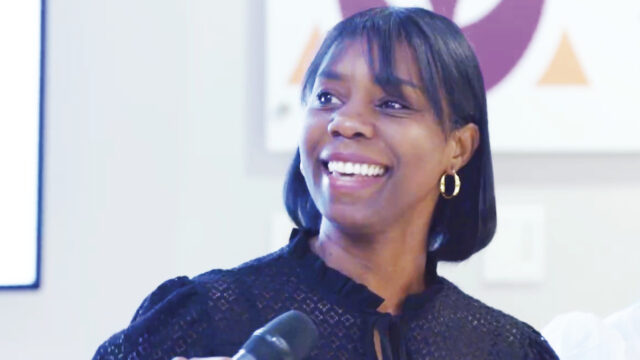
When Tarwo Konbloa came to the United States from a Cote d'Ivoire refugee camp at age 11, he struggled in school. The soccer field was the only place he found solace.
“I thought school was like a prison,” says Konbloa. “I was sitting for too long. But playing soccer became a release, something that brought me peace.”
The longer hours at Crestwood Middle School, in Michigan, took some getting used to for Konbloa. In Cote d'Ivoire, where his mom had fled from war-torn Liberia with her three children, education was a means to an end. Konbloa spent only two hours a day in school learning French, the local language.
School in the U.S. didn't come easy, but soccer motivated him to try harder. It gave him a way to practice speaking English outside of the classroom. Besides, his coach told him if he didn’t keep his grades up, he wouldn’t be able to play. And that wasn’t an option for Konbloa.
In addition to two soccer practices a day, Konbloa put everything into his school work. Still, he didn’t yet see the importance of education. His mom and dad never finished middle school. His family's focus was on survival. Where would their next meal come from? Where would they sleep?
But when teachers at Crestwood introduced Konbloa to the Read 180 intervention program, his outlook changed. The step-by-step guidance clicked for him. Learning no longer felt frustrating. “The roadblock was gone,” he says.
A game-changing education
Watch as Tarwo Konbloa returns to Crestwood Middle School in Kentwood, Michigan to reunite with the teachers who made a big impact on his life and share his own Read 180 journey with students.
‘Read 180 opened a door for me’
Konbloa credits Read 180 with helping him to pick up new vocabulary in a way that stuck and guiding him to sound out words as he learned to read in English. The structure of the lessons appealed to him: listen to a word, repeat it, get a definition, read the word in context, use it in conversation.
Moving up reading levels in the program became easier with each passing lesson. Then something he never thought possible happened. The confidence he felt on the soccer field sprung up in the classroom.
“Read 180 opened a door for me,” says Tarwo. “The program helped me to challenge myself in reading, and I was able to apply the concepts I was learning to math, science, and other subjects.”
He still dreamed of being a soccer star. College wasn’t yet a part of his plan. But he was beginning to love learning, and he wanted to help struggling classmates do the same.
“Tarwo was a quiet student at first,” says Melissa Mulder, Konbloa’s former teacher. “But as he started gaining more skills in the Read 180 program, and being able to communicate more, he rose up as a leader.”
As he started gaining more skills in the Read 180 program, and being able to communicate more, he rose up as a leader.
Tarwo Konbloa's former Read 180 teacher
A foundation for academic success
Konbloa’s academics improved through a mix of perseverance, intervention, and dedicated teachers. After two years of Read 180 in Grades 6–8, Konbloa no longer needed the extra support. The program gave him a foundation for success in high school, where he also grew into a soccer superstar.
“If you believe in your heart, anything is possible,” says Konbloa.
Unfortunately, an injury shattered his dreams of going pro. But the strong foundation in academics allowed him to earn a college degree. Now he’s paying it forward as a physical education teacher in a public elementary school in Michigan. He also coaches junior varsity soccer.
Recently, he returned to Crestwood Middle School to talk to students in its Read 180 program. It was an emotional moment for Konbloa.
“This is where my journey started,” says Konbloa. “Coming back to the classroom, seeing where I used to sit, it was hard to hold it in. I guess you can call it happy tears.”
He hopes his life can serve as an example for students, so that they can feel inspired to ask the same question he asks of himself every day: “This is the opportunity that you have; can you seize it?”
I want students to see my path and know that if I can do it, they can too.
Former Read 180 student
25 years of raising reading achievement
A core tenet for HMH is the belief that a supportive teacher paired with the right curriculum can turn any student into a scholar. Since its launch in 1999, Read 180 has helped countless students like Konbloa achieve grade-level proficiency. The intervention program for Grades 3–12 has been validated by over 100 studies that prove its effectiveness. Students using Read 180 in one study gained an average of 1.9 years‘ worth of growth in one year.
“I want students to see my path and know that if I can do it, they can too,” says Konbloa. “I want them to be able to look back as I do now and say, ‘I’m glad this program existed. I’m glad that this program allowed me to do what I’m able to do now outside of the classroom.’”
Konbloa is also thankful for the teachers who believed in him, even when he didn’t always believe in himself. Their faith in his abilities helped him to dream beyond the soccer field and inspire others along the way.
“If you would have asked me when he was 14, what do you think he’ll do?” says Mandi Ferch, one of Konbloa’s former Read 180 teachers at Crestwood. “I would have said he’s going to be a teacher or he’s going to run the world.”
***
Learn how our reading intervention programs can accelerate growth of students who are reading below grade level.
Get our free reading intervention ebook today.
Related Reading

Ms. Madge Alexandre, Miami-Dade reading teacher and Read 180 user















